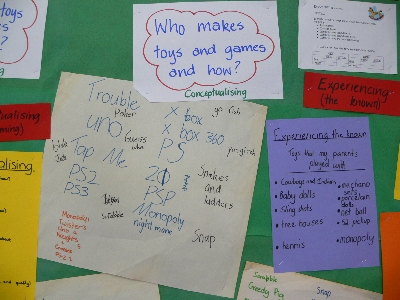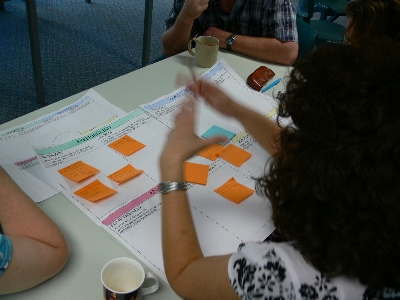
Holistic assessment and ongoing evaluation needs to be integrated into your designs for learning. Tracking how learners are performing, providing evidence of their engagement and transformations is a necessary part of the learning process. Assessment, however, is a challenging task and has many different purposes, so it needs to be carefully considered and planned. Following are some principles and suggestions for practice:
- It’s not (just) the test at the end—make sure assessment is ‘for learning’ (formative assessment) and not just ‘of learning’ (summative assessment).
- Evaluate performance over a whole Learning Element, or a special assessment task (such as a concluding joint or individual project) which tests the full range of knowledge processes required in the Learning Element.
- Build in multiple feedback loops, thus making assessment ubiquitous.
- Involve multiple voices in the feedback process: self (think aloud), peers, parents, subject matter experts, invited critical friends.
- Assess performance as well as knowledge: experiential, conceptual, analytical and applied.
- Measure the ‘new basics’ and not just the old: multimodal expression, collaboration skills, problem solving, metacognition, creativity-imagination-innovation.
- Assess individuals in a group context: the ability to make productive social connections (to texts and people, and collaboratively constructed knowledge).
- Include systematic peer review in the assessment process (open, one-way blind, two-way blind, moderated).
- Assess capacities to source and deploy knowledge—not just what they can memorise for a text, but what a learner can source in relationships of collective intelligence (e.g. group work) and from available knowledge resources.
- Use qualitative judgements to justify quantitative ratings.
- Have learners build individual portfolios (e.g. digital portfolios) where the proof of the result is in the portfolio as much as the commentary and rating; assess the knowledge work a student does, and not just what you can infer they have learnt in an end-of-program test.
Assessment Schema
Following is a schema for the ongoing evaluation of knowledge processes that can be integrated into planned learning experiences. Consider how you might integrate this into your practice.

The schema allows you to track each of the knowledge processes:
- Experiencing
- Conceptualising
- Analysing
- Applying
It also enables you track how well a learner is moving from
- The competence to think and act with assistance
- The competence to think and act independently
- The competence to perform collaboratively
In this schema, the capacity to make and share knowledge with others is considered the most difficult and higher order level of competence because it involves communication, negotiation and sensitivity as well as sound knowledge of a subject or capacity to undertake a task.
Following are a set of templates that provide:
- Assessment criteria – based on knowledge processes | download
- Teacher rating sheet – suggesting weightings for level s of performance | download
- Peer review forms – to enable learners to evaluate each other’s performance | download
